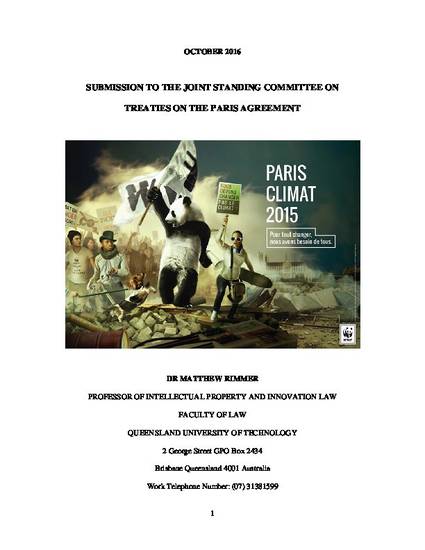
Presentation
Submission to the Joint Standing Committee on Treaties on the Paris Agreement
Joint Standing Committee on Treaties
(2016)
Abstract
The Joint Standing Committee on Treaties is inquiring into the Paris Agreement of the United Nations Framework Convention on Climate Change 2015 [2016] ATNIF 31. The Australian Government has produced a National Interest Analysis [2016] ATNIA 10. Amongst other things, the Paris Agreement 2015 featured significant debate over the role of technology in respect of addressing climate change.
The United Nations Secretary-General Ban Ki-Moon has commented: ‘Intellectual property, technology transfer, and financing are among a wide range of topics that must be addressed in the context of climate change and sustainable development’. The Paris Climate Talks considered a number of issues related to intellectual property, technology transfer, finance, and climate change.
Draft Article 56.3 laid down a number of options. The first option suggests a number of possibilities to facilitate technology transfer. Item A suggests that developed countries ‘provide financial resources to address barriers caused by intellectual property rights (IPRs) and facilitate access to and the deployment of technology, including inter alia, by utilizing the Financial Mechanism and/or the establishment of a funding window under the Green Climate Fund / the operating entities of the Financial Mechanism.’ Item B calls for ‘an international mechanism on IPRs to be established to facilitate access to and the deployment of technology to [developing country Parties].’ Item C calls for other arrangements to be established to address intellectual property rights – such as ‘collaborative research and development, shareware, commitments related to humanitarian or preferential licensing, fully paid-up or joint licensing schemes, preferential rates and patent pools.’ Item D suggests that ‘funds from the Green Climate Fund will be utilized to meet the full costs of intellectual property rights (IPRs) of environmentally sound technologies and know-how and such technologies will be provided to developing country Parties free of cost in order to enhance their actions to address climate change and its adverse impacts.’ The second option is that ‘Parties recognize that IPRs create an enabling environment for the promotion of technology innovation in environmentally sound technologies.’ The third option favoured by developed countries is that ‘IPRs are not to be addressed in this agreement.’ The fourth option is for ‘Developed country Parties to make available Intellectual Property (IP) through multilateral institutions as public good, through purchase of intellectual property.’
The final text of the Paris Agreement 2015 avoids dealing with intellectual property and climate change directly. Nonetheless, there are glancing references to traditional knowledge in the context of a larger debate about Indigenous Knowledge. There is some extensive text, more generally, about technology research, development, and dissemination in the Paris Agreement 2015. At the Paris talks, Indian Prime Minister Narendra Modi contended that: ‘Our innovation initiative should be driven by public purpose, not just market incentives, including on IP.’ He emphasized that: ‘We need to scale up the Green Climate Fund that will improve access to technology and intellectual property.’ For his part, US President Barack Obama flagged that he was willing to engage in a dialogue over matters of technology transfer. The Paris Climate Talks also saw a number of announcements on innovation – including Mission Innovation, the Breakthrough Energy Coalition, and the International Solar Alliance.
Recommendations
This submission focuses upon issues relating to intellectual property, technology transfer, and innovation in respect of the Paris Agreement 2015.
Recommendation 1
Australia should seek to ratify and implement the Paris Agreement 2015.
Recommendation 2
There is a need to harmonise the international regimes in respect of intellectual property and climate change, with a joint declaration by key international organisations, such as the UNFCCC, the World Trade Organization, and the World Intellectual Property Organization.
Recommendation 3
The Paris Agreement 2015 further consolidates the Technology Mechanism and the Finance Mechanism in the International Climate Framework. Above and beyond the Paris Agreement 2015, there is a need to address intellectual property and climate change in future international climate agreements. An Intellectual Property Mechanism could be a useful addition. Australia should seek to play a stronger role in the Technology Mechanism – the UNFCCC Climate Technology Centre and Network.
Recommendation 4
The TRIPS Council has been holding ongoing debates over intellectual property and climate change. There is a need to update the TRIPS Agreement 1994 to better address intellectual property and climate change.
Recommendation 5
The World Intellectual Property Organization has considered intellectual property and climate change as part of its agenda to tackle global issues. WIPO GREEN has played a useful technical role. There is a need for the World Intellectual Property Organization to address substantive and procedural issues in respect of intellectual property and clean technologies.
Recommendation 6
There is a need for patent regimes to ensure the quality of patent applications, generally. Green patent fast-track systems have been put into place around the world in a variety of patent offices. Professor Eric Lane has recommended the establishment of a Green Patent Highway.
Recommendation 7
There has been significant patent litigation in respect of clean technologies. There have been concerns about both infringement of patent rights of innovative clean technology companies; and abuse of the intellectual property rights by patent trolls. There are larger questions about the interaction between patent law and competition policy in the context of clean technologies.
Recommendation 8
As a net importer of patented technologies (including clean technologies), there is a need for Australia to make strategic use of patent flexibilities – such as experimental use, public licensing, patent pools, compulsory licensing, and state use. The Productivity Commission has made useful recommendations on how to modernise Australia’s patent regime.
Recommendation 9
The Paris Agreement 2015 further builds upon the Technology Mechanism of the UNFCCC Climate Technology Centre and Network. Australia currently does not play a key role in the Technology Mechanism. Given Australia’s ‘Ideas Boom’ innovation policy, it is important that Australia plays a leadership role in this clean technology network. Australia should also participate in other technology networks announced at the Paris International Climate Talks – including Mission Innovation, the Breakthrough Energy Coalition, and the International Solar Alliance.
Recommendation 10
There is a need to further experiment with models of Open Innovation in respect of clean technologies. The Eco-Patent Commons, the Green Xchange, and Elon Musk’s Open Innovation should be emulated in Australia.
Recommendation 11
Innovation prizes – such as the L-Prize, the H-Prize and X Prizes – have been a useful means of encouraging research and development in respect of clean technologies.
Recommendation 12
From the perspective of Australia, it is daunting that other nations – including the United States, Germany, Nordic countries, Japan, Korea, and China - dominate the patent filings in respect of clean technologies. Australia needs to improve its performance in regard to the research, development, and deployment of renewable energy. The ‘Ideas Boom’ Innovation Policy should address this problem.
Recommendation 13
There has been a proliferation of green trade marks and eco-labels. There is a need for transparency, accountability, and legitimacy in terms of the assessment of such marks and labels.
Recommendation 14
There is a need for competition and consumer regulators to take action in respect of misleading and deceptive conduct – such as greenwashing, astroturfing, and climate deception. The dispute over VW’s ‘Dieselgate’ is a useful case study in this context.
Recommendation 15
Green buildings and designs could be encouraged under the copyright regime and the designs regime.
Recommendation 16
The United States and the European Union have been concerned about trade secrets theft in respect of confidential information relating to clean technologies.
Recommendation 17
The Obama Administration encouraged scientific agencies like NASA and NOAA to make climate data open and accessible.
Recommendation 18
There have been significant interactions in respect of intellectual property, food security, and climate change. Plant breeder’s rights, patents on climate ready-crops, and farmers’ rights have raised interesting questions about ownership and access to clean technologies. Norway’ Svalbard Global Seed Vault – the ‘Doomsday Vault’ – is a Big Science Project designed to provide insurance for plant genetic resources against climate change, natural disasters, and other emergencies.
Recommendation 19
There is a need to better align biodiversity conservation efforts and climate action. The principles of access to genetic resources, informed consent, and benefit-sharing could certainly play a role in achieving better outcomes in this field.
Recommendation 20
There is a need for better recognition of Indigenous Intellectual Property – including in respect of Indigenous environmental and climate knowledge.
Recommendation 21
The Paris Agreement 2015 could be undermined by the use of investor-state dispute settlement against climate action measures (such as for instance, the action by TransCanada against President Barack Obama’s decision to block the Keystone XL Pipeline). Some commentators such as Gus van Harten and Maude Barlow argued that the Paris Agreement 2015 include language to prevent use of investor-state dispute settlement clauses against climate measures.
Recommendation 22
There has been concern that the Paris Agreement 2015 could be undermined by the passage of the Trans-Pacific Partnership – the Pacific Rim regional trade agreement.
Keywords
- Paris Agreement,
- UNFCCC,
- Intellectual Property,
- Climate Change,
- Technology Transfer,
- Climate Finance,
- Patent Law,
- Trademark Law,
- Copyright Law,
- Indigenous Intellectual Property,
- Climate Law,
- International Law
Disciplines
Publication Date
October 1, 2016
Citation Information
Matthew Rimmer, ‘Submission to the Joint Standing Committee on Treaties on the Paris Agreement 2015’, Australian Parliament, October 2016, https://eprints.qut.edu.au/101107/
